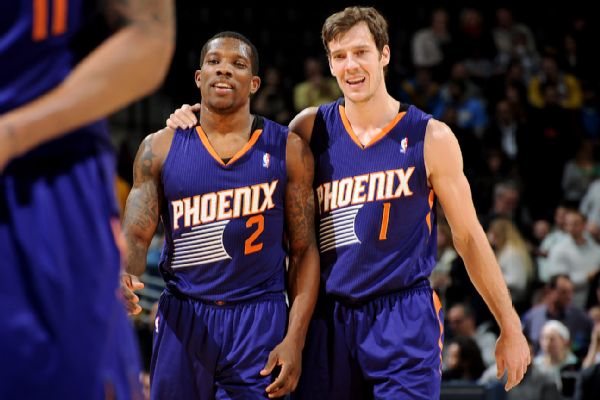Eric Bledsoe may try to regain control of his own future.
Hopefully it won’t wind up costing him lots of money.
According to ESPN.com’s Chris Broussard, it appears that Bledsoe could accept the Phoenix Suns’ qualifying offer rather than sign the four-year, $48 million deal they reportedly have on the table:
Looking like qualifying offer. Relationship w/Phx going n wrong direction"@kevininzunza31: @Chris_Broussard Any news on Eric Bledsoe Chris?"
— Chris Broussard (@Chris_Broussard) August 5, 2014
This is one of those “believe it when you see it” type moments.
If Bledsoe simply accepts the qualifying offer, he’ll be earning a little over $3.7 million next season. That’s a huge difference compared to the $10-plus million Phoenix’s current offer could net him. This is why you don’t see restricted free agents coming off rookie deals typically leave their teams. There’s too much money involved.
Although Bledsoe can simply eat the difference next year, play through 2014-15 and have complete control over his free-agent destiny next summer as an unrestricted mercenary, there’s no guarantee a deal like this is waiting for him. After joining LeBron James, Stephen Curry, James Harden and Chris Paul as the only five NBA players to average at least 17 points, four rebounds, five assists and 1.5 steals per contest while drilling 45 percent if their shots, you’d like to think there would be. But Bledsoe would also like to think there’s a max offer sheet out there waiting for him, thereby forcing Phoenix’s hands.
And there’s not. The Philadelphia 76ers are the only remaining team with that kind of coin and, well, they’re not trying to add players who are going to help them win games. Nor do they have a legitimate need at point guard.
If Bledsoe injures himself—knee issues limited him to only 43 games last year—or he plays poorly, all that money will be gone and he’ll be forced to rebuild his image and market value, potentially from scratch. That’s all while knowing he could have landed $48 million and set himself up for life no matter what.
All of which suggests this is a leverage play. Bledsoe has no other way to gain the upper hand. Incumbent teams rule restricted free agency with an iron first. They have all the power—the power to match and, as we’ve seen in the Suns’ case, the power to deter outside teams from throwing out competing offers by making it clear they’ll match anything and everything.
Interested teams could still offer a contract, of course, but who wants to tie up their cap space for 72 hours on a player they won’t ever have? Early in free agency, probably no one. Only a few select clubs—like the Dallas Mavericks—are willing to do that.
At this point of the offseason, long after most of the prominent free-agency chips have fallen, you can bet your ass teams will take that risk. But that brings us back to the underlying problem here: previous action has bilked most, if not all, teams of their spending power, leaving Bledsoe to do just this.
Will it work out? If he plays out of his mind next year after accepting Phoenix’s qualifying offer, most definitely.
As for whether he actually plans on following through with this threat, well, that remains to be seen.
Dan Favale is a firm believer in the three-pointer as well as the notion that defense doesn’t always win championships. His musings can be found at Bleacherreport.com in addition to TheHoopDoctors.com.




















